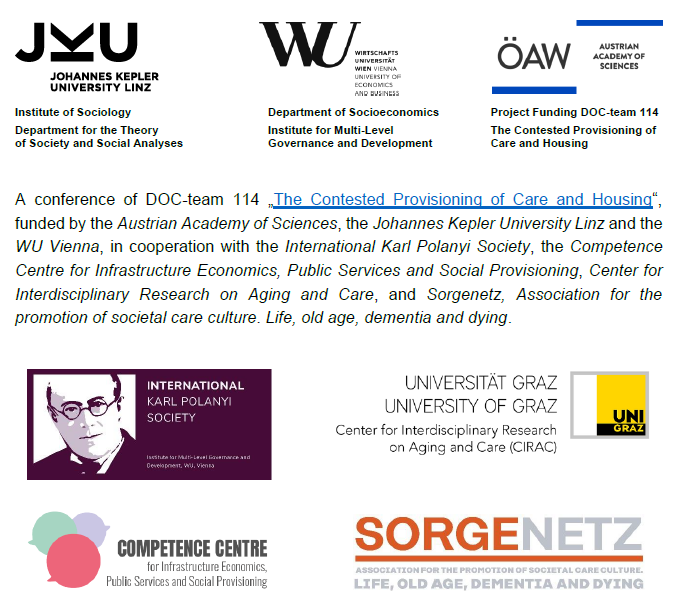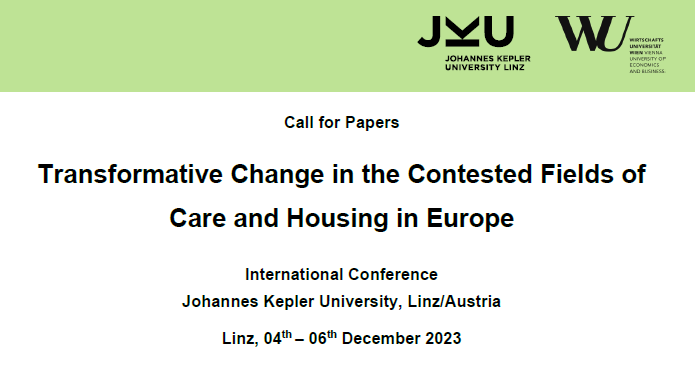CALL FOR PAPERS
Care and housing are foundational for human well-being. Both deal with organising and
sustaining livelihoods: while care as a human activity reacts to the ever-given contingency
of life, housing arranges a place for undertaking everyday need-satisfying activities. In both
fields, crises have exacerbated over the last decades, manifesting in care gaps, labour
and care migration, and precarious working conditions of care workers, respectively in
overburdening costs due to the transformation of homes into assets, leading to
gentrification and segregation. Despite being seldomly investigated together, care and
housing as well as their related crises are co-constitutive.
From the 1990s onwards, two simultaneous tendencies can be observed in European care
regimes and housing systems. On the one hand, neoliberal reforms have aimed at
privatisation, commodification, marketisation, and financialisaton. This has rearranged
welfare states, promoting variegated forms of capitalism. Allegedly singular events like the
global financial crisis, subsequent austerity measures, the Covid-19 pandemic, and the
current cost of living crisis have furthermore deepened structural problems of access and
affordability. This has led to increasing socioeconomic and spatial polarisations as well as
social inequalities in the relations of gender, race, and class. On the other hand, these
developments have transformed the provision of care and housing into a contested terrain
leading to labour disputes and struggles, such as care protests, or initiatives for
expropriating institutional investors. The wide range of community-based or infrastructural
projects has to be seen against the backdrop of the increasing search for alternative care
and housing provision. On top of that, rapid technological developments and climate
change further accelerate the reorganisation of care and housing arrangements and
practices built up by all parties involved in both contested fields.
Given these multiple transformations, the conference “Transformative Change in the Contested Fields of Care and Housing in Europe” seeks to analyse the contemporary developments in care regimes and housing systems and respective configurations of care
and housing.
Of particular interest is research which reflects on the connections of the two
fields. We aim at a broad interdisciplinary dialogue of social sciences to grasp different
perspectives of these multidimensional changes. Thus, we welcome scholars from
disciplines like sociology, socioeconomics, political economy, political science, geography,
philosophy, history, and interdisciplinary strands like gender and intersectionality studies
to contribute to the common investigation and discussion of the contested and entangled
fields of care and housing in Europe. We welcome both, theoretical approaches, and
empirical research, to analyse and reflect on the contemporary transformations, its causes,
and effects as well as commonalities and differences between fields and countries,
between city and countryside.
The conference aims at addressing the following questions with the explicit intention of
using multiple theoretical perspectives and to grasp the broad diversity of European
countries, regions, and cities:
• What are the driving forces of transformative change in the fields of care and housing?
Which social, economic, political, cultural, and technological dynamics and which
norms and values, demands and claims shape modes of care and housing provision?
• How do markets, the state, the family and the community reorganise care and
housing? What are other key actors in different institutional contexts at multiple levels
(from local to global)?
• Which disputes take place in “doing care” and “doing housing”? How do these relate
to multi-scalar struggles over working conditions, wages, and affordability as well as
the design of liveable neighbourhoods?
• What are relevant economic and political orders, welfare regimes, and social policies
and how do they structure different forms of care and housing provision?
• How do new modes, forms, and arrangements of care and housing provision promote
a different understanding of life and work? How are they interrelated with the
reorganisation of paid, unpaid and volunteer, professional and lay work and new forms
of work organisation?
• How are modes of care and housing provision and the transformative change in the
configuration of care and housing affected by the development and implementation of
digital technologies? How does technological change influence the meaning and
organisation of care and housing?
• How are modes of care and housing provision and the transformative change in the
configuration of care and housing affected by the climate crisis? How does it contribute
to changes in the governance of communities, neighbourhoods, and the living
environment to reconfigure care and housing provision?
• How do social, economic, gendered, and ethnic inequalities and socio-spatial
polarisations shape the organisation of care and housing? How do they affect
transformative change, social and ecological demands, and digitalisation of care and
housing arrangements?
• What are the commonalities and differences in the provision of care and housing?
How can theoretical and methodological approaches contribute to a better
understanding of care and housing in Europe? What are the potentials and limitations
of approaches that integrate both fields?
Abstract submission:
We invite researchers to submit an abstract (250-300 words and full affiliation of the
author/s) by 31st July 2023 and will inform you about the acceptance of your paper by 31st
August 2023. Please send your submissions to contestedcareandhousing@jku.at. The
conference language is English. Travel and accommodation costs will not be covered by
the organisers; there are no conference fees.


“Transformative Change in the Contested Fields of Care and Housing in Europe “
We invite you to participate in the conference, which aims at addressing diverse questions with the explicit intention of using multiple theoretical perspectives and to grasp the broad diversity of European
countries, regions, and cities.
31st July, 2023
Submission Deadline
We invite researchers to submit an abstract (250-300 words and full affiliation of the
author/s) by 31st July 2023 and will inform you about the acceptance of your paper by 31st
August 2023. Please send your submissions to contestedcareandhousing@jku.at. The
conference language is English.
Organised by:
Johannes Kepler University Linz,
WU Vienna,
Austrian Academy of Sciences – ÖAW,
University of Graz,
Competence Centre for Infrastructure Economics, Public Servies and Social Provisioning,
Sorgenetz
Organizers and chairs:
Brigitte Aulenbacher
Andreas Novy
Valentin Fröhlich
Benjamin Baumgartner
Florian Pimminger
Hans Volmary
Administration:
Tobias Eder